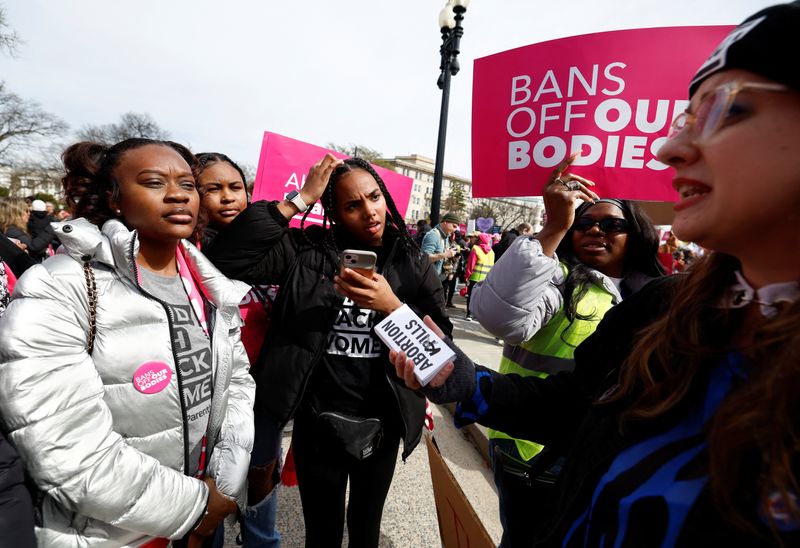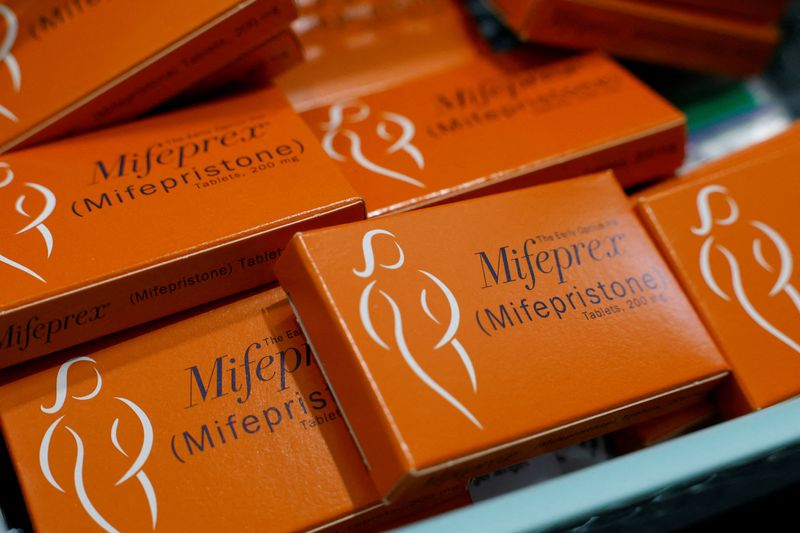By Andrew Chung and John Kruzel
WASHINGTON (Reuters) -The U.S. Supreme Court on Tuesday signaled that it is unlikely to limit access to the abortion pill as the justices appeared skeptical that the anti-abortion groups and doctors that are challenging the drug have the needed legal standing to pursue the case.
The justices heard arguments in an appeal by President Joe Biden's administration of a lower court's ruling in favor of the plaintiffs that would limit how the medication, called mifepristone, is prescribed and distributed. The case places reproductive rights back on the Supreme Court's agenda in a presidential election year.
The Food and Drug Administration's (FDA) regulatory actions at risk in the case include allowing for medication abortions at up to 10 weeks of pregnancy instead of seven, and for mail delivery of the drug without a woman first seeing a clinician in-person.
The justices spent much of the arguments focusing on whether the plaintiffs had the legal standing to bring their claims of imminent injury by the FDA's actions. The plaintiffs have said they will be forced to violate their consciences by handling emergency complications that may arise in women who take the medication, which the FDA approved in 2000.
Solicitor General Elizabeth Prelogar told the justices that the plaintiffs do not come "within 100 miles of the kinds of circumstances" needed to show legal injury.
Conservative Justice Brett Kavanaugh highlighted the existing federal laws that already shield medical personnel from having to perform or assist in abortions.
"Just to confirm on the standing issue, under federal law, no doctors can be forced against their consciences to perform or assist in an abortion, correct?" Kavanaugh asked Prelogar.
"Yes," Prelogar replied, "we think that federal conscience protections provide broad coverage here."
The administration has said the "conscience" harms voiced by the challengers are especially remote from the FDA's actions because they specifically relate to being to forced to perform or complete an abortion.
Conservative Justice Amy Coney Barrett agreed that for these plaintiffs, "the conscience objection is strictly to actually participating in the abortion to end the life of the embryo or fetus." But Barrett told Erin Hawley, a lawyer with the Alliance Defending Freedom conservative religious rights group representing the plaintiffs, that the medical association member doctors did not provide evidence they ever participated in such an event.
IN THE AFTERMATH OF ROE
This is the most important abortion-related case to come before the Supreme Court, which has a 6-3 conservative majority, since it overturned its 1973 Roe v. Wade precedent that had recognized a constitutional right to abortion in 2022.
Conservative Justice Samuel Alito, who authored that decision, pressed Prelogar to identify who could sue the FDA.
"Is there anybody who can sue and get a judicial ruling on what FDA did was lawful?" Alito asked. "Shouldn't somebody be able to challenge that in court?"
The agency has said that after decades of use by millions of women in the United States and around the world, mifepristone has proven "extremely safe," and that "study after study" has shown that "serious adverse events are exceedingly rare."
The plaintiffs, Prelogar told the justices, "just disagree with the agency's analysis of the data before it. But that doesn't provide a license to authorize judicial second-guessing of the agency's expert judgments."
After the 2022 ruling, numerous states enacted Republican-backed measures banning or sharply restricting abortions. Since then, medication abortion has become the most common method of ending pregnancies in the United States, now accounting for more than 60% of abortions. Mifepristone is taken with another drug called misoprostol to perform medication abortions.
Liberal Justice Ketanji Brown Jackson asked about what she called a mismatch between the plaintiffs' claimed legal injury and the results they seek in the lawsuit.
"They're saying, 'Because we object to having to be forced to participate in this procedure, we're seeking an order preventing anyone from having access to these drugs at all,'" Jackson said. "And I guess I'm just trying to understand how they could possibly be entitled to that."
Jessica Ellsworth, the lawyer representing mifepristone maker Danco Laboratories, told the justices that the position taken by the plaintiffs would upend not just this medication but "virtually every drug approval" and risk evaluation changes for medications made by the FDA for decades.
The 2022 lawsuit challenged the FDA's approval of the pill and its actions since then to broaden access. A federal judge's ruling that would have effectively pulled the drug off the market was narrowed by the New Orleans-based 5th U.S. Circuit Court of Appeals last year to cover 2016 and 2021 FDA actions that made it more widely available.

The 5th Circuit's ruling remains on hold pending the Supreme Court's review. A ruling is expected by the end of June.
Biden, seeking a second term in office in the Nov. 5 U.S. election, is an outspoken advocate for abortion rights. He and his fellow Democrats have sought to this a central theme against Republicans ahead of the election.
